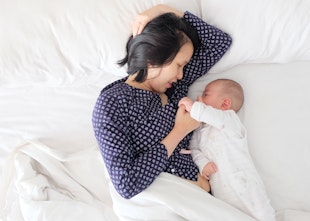FFHQ Pregnancy Expert and Midwife Avril Flynn explains the difference between baby blues and Postnatal Depression.
Having a baby is one of the most monumental events in any one’s life. Even in the best of cases, with all going well and with great support, it remains an experience that can be tough, both mentally and physically.
However, before you read another word, please take note of something very important and really essential: your mental well-being is as just as important as your physical well-being.
Physically, if things go wrong after you have your baby, for example, if you pick up an infection, or if you bleed postnatally, then these are the things that are obvious. In most cases, they are complications that are simple to diagnose and simple to treat.
Unfortunately, the challenges for your mental health and mental wellness can be a lot trickier to recognise, understand and recover from.
"Baby Blues"
The vast majority of women who give birth will experience what’s commonly referred to as the ‘baby blues’.
Why does this happen? Well simply put, over the course of the roughly 10 months of your pregnancy, your body adapts and is affected by all accompanying hormones and physical changes. The changes are gradual.
Then birth occurs and suddenly your body has to adapt in a much smaller window. The result is that usually between day 3 and 5 after you give birth to your little human, you may experience the ‘baby blues’.
You may have symptoms of tearfulness, feeling overwhelmed, exhaustion and generally feeling vulnerable and very fragile. This is normal! Even though these feelings are normal, it is vitally important that you express how you are doing.
Talk to your love about how you feel and very importantly, understand that roughly 7 days after birth, the fog should lift. While of course you will have tough moments and days, in the main you should feel ok. The big difference between the ‘baby blues’ and postnatal or postpartum depression (PND) is the feelings don’t go away- you suffer the symptoms most of the time and while some days you may feel ok, for the most part, you don’t.

Postnatal Depression
It is estimated that up to 1 in 7 women who give birth may suffer the symptoms of PND to some extent. The symptoms are many and vary widely between sufferers but can include prolonged feelings of sadness, worthlessness, irritability, hopelessness or rejection of your partner or your baby.
You can feel massively anxious, that you can’t cope, fear that something bad is going to happen to you or baby, that you aren’t bonding, an inability to sleep, feeling tired constantly (even after sleeping), being unable to eat or eating too much or just a constant feeling of dread or fear.
It is horrible to have those feelings but with the normal difficulties of looking after a baby, it is very possible that you might be suffering from PND and not realise it.
In fact, you might be the last person to realise that things are not right. Other people might notice the symptoms first, for example, your partner, your parents, your public health nurse, doula, GP or a good friend. They might be the person to ask the very important question of “How are YOU doing?”.
So, what can you do?
The most important thing is to recognize that you might be a problem and realise there is zero shame in admitting it.
If a week to two weeks after giving birth you are feeling any of the symptoms I’ve mentioned or if you are feeling really angry, or afraid or that things are ‘not right’ then SAY IT!
It might just simply be you are having a challenging time, or it might be that you are in the grip of a recognisable, treatable and all too common health challenge- PND.
Talk and keep talking if things feel wrong. I promise that there is support and always a light at the end of the tunnel. You’ve got this Mama! Please be kind to yourself and remember to ask yourself honestly, ‘Are you ok?’.
Further information:
https://www.hse.ie/eng/services/publications/children/postnatal-depression-a-guide-for-mothers,-family-and-friends.pdf
https://www2.hse.ie/conditions/mental-health/postnatal-depression/postnatal-depression.html







